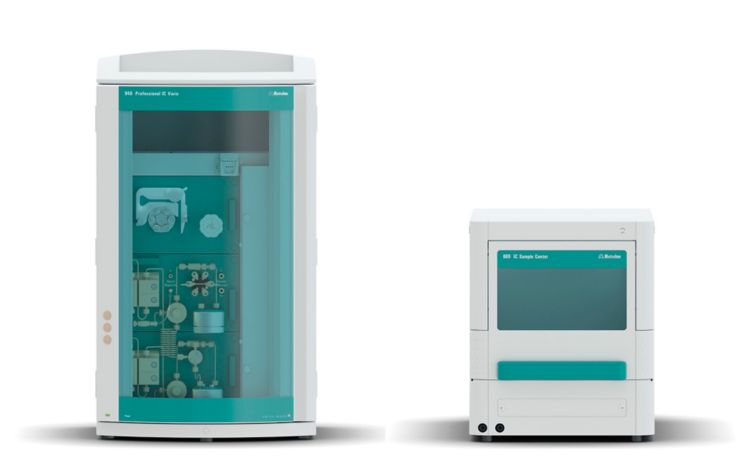Sodium chloride tablets are used to treat low sodium levels or to replenish electrolytes as prevention against heat cramps [1]. The quality of these tablets must adhere to strict requirements such as those addressed by the U.S. Pharmacopoeia (USP) to ensure their safety and compliance with the permitted levels of ingredients. For sodium chloride tablets, <USP29> specifies that the NaCl content must fall within 95–105% of the labeled amount.
The USP has embarked on a global initiative to modernize many of their existing monographs. As an alternative to titration, ion chromatography (IC) with suppressed conductivity detection has been approved by the USP as a validated method to quantify chloride content in NaCl tablets for solution or oral use [2]. The Metrosep A Supp 17 - 150/4.0 column guarantees reliable separation of chloride and the potential impurity nitrite, while the Metrohm suppressor module (MSM) ensures low background noise. The presented IC method was validated following the USP General Chapter <1225>, Validation of Compendial Procedures [3].

Sodium chloride tablets for oral use or solution (100 tablets, distributed by Consolidated Midland Corporation, Brewster, New York 10509 USA) with a labeled amount of 1 g NaCl were used for the qualification procedure. A sample stock solution of nominally 5 mg/mL NaCl was prepared as follows. Not less than 30 tablets were ground into a powder. Approximately 5 g of the powder was transferred into a 1000 mL volumetric flask and dissolved in approximately 50% of the final volume of ultrapure water (UPW) and then filled to the mark with UPW.
Out of the stock solution, the sample solutions with a nominal concentration of 100 μg/mL NaCl were prepared by dilution with UPW. Here, 10 mL of sample stock solution was transferred to a 500 mL volumetric flask, diluted to volume, and mixed well. A single point calibration with 100 μg/mL of USP Sodium Chloride RS in UPW was used.
The samples were injected directly into the IC (Figure 1) without any further sample preparation and analyzed according to the parameters stipulated in the USP monograph (Table 1). Chloride was separated from all other components (Figure 2) using a binary potassium hydroxide gradient (Table 2) on a Metrosep A Supp 17 - 150/4.0 column with packing material L91 – a certified alternative column for this method (Table 1). The conductivity signal was detected after chemical suppression.
| Column with L91 packing | Metrosep A Supp 17 - 150/4.0 |
|---|---|
| Flow rate | 1.2 mL/min |
| Column temperature | 35 °C |
| Injection volume | 10 μL |
| Detection | Conductivity with suppression |
| Time (min) | Solution A (%) | Solution B (%) |
|---|---|---|
| 0 | 5 | 95 |
| 12 | 70 | 30 |
| 15 | 5 | 95 |
| 24 | 5 | 95 |
The IC assay for sodium chloride content in sodium chloride tablets was validated according to USP General Chapter <1225>, Validation of Compendial Procedures [3]. Sodium chloride tablets, USP («normal salt tablets for solution or oral use 1 gram»), were analyzed for their chloride and nitrite content, and the accuracy of the sodium chloride determination was calculated as 101% (Figure 2).
Separation of chloride and nitrite peaks with the Metrosep A Supp 17 (L91) column achieved a resolution of >2 as required by USP definitions (Figure 3). All acceptance criteria were fulfilled, e.g., asymmetry (tailing factors) for the chloride and nitrite peaks were <2, or the relative standard deviation of standard solutions was <2.0% (n = 6) (Table 3).
| Performance characteristics | Acceptance criteria | Results |
|---|---|---|
| Resolution | Resolution between the chloride and nitrite peaks is NLT 2.0 | 2.07 |
| Tailing factor | Tailing factors (asymmetry) for the chloride and nitrite peaks are NMT 2.0 | 1.25 and 1.35 respectively |
| Repeatability | Relative standard deviation for the chloride peak in the standard solution is NMT 2.0% for six replicates | 0.039% |
| Accuracy | Average % recovery should be 95.0–105.0% of the manufacturer’s CoA value | 101% |
Ion chromatographic analysis of sodium chloride using the Metrosep A Supp 17 separation column qualified as a USP-validated approach for the quantification of sodium chloride in sodium chloride tablets for solution or oral use. The Metrosep A Supp 17 column contains the alternative packing material L91 approved for the USP monograph «Sodium Chloride in Sodium Chloride Tablets for Solution or Oral Use». Beside the chloride content, nitrite impurities can also be accurately determined in the same analysis.
[1] Anastasiou, C. A.; Kavouras, S. A.; Arnaoutis, G.; et al. Sodium Replacement and Plasma Sodium Drop During Exercise in the Heat When Fluid Intake Matches Fluid Loss. Journal of Athletic Training 2009, 44 (2), 117–123. https://doi.org/10.4085/1062-6050-44.2.117 .
[2] Sodium Chloride Tablets for Solution; Monograph; U.S. Pharmacopeia/National Formulary: Rockville, MD. https://doi.org/10.31003/USPNF_M76140_02_01.
[3]〈1225〉Validation of Compendial Procedures; General Chapter; U.S. Pharmacopeia/National Formulary: Rockville, MD. https://doi.org/10.31003/USPNF_M99945_04_01.
Internal reference: AW IC IN6-2039-102020
 Compartilhar aplicação
Compartilhar aplicação
 Download do PDF
Download do PDF